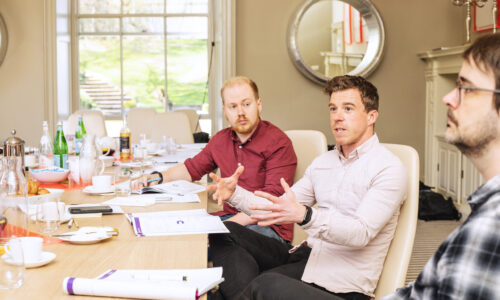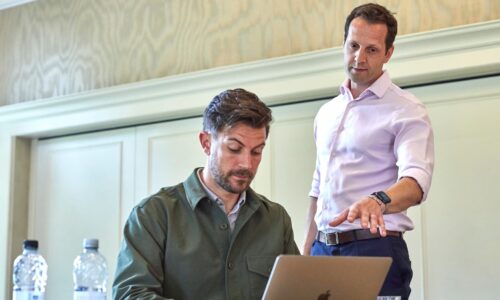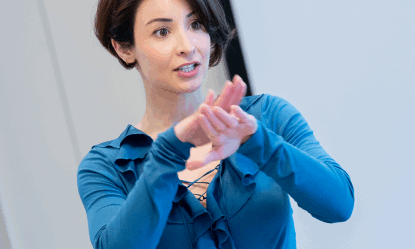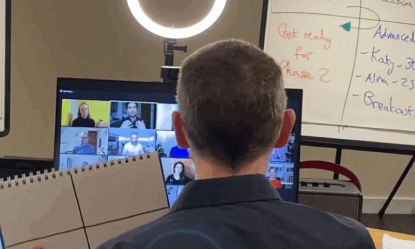Anyone for tennis? You may have noticed there’s a big tennis tournament taking place at the moment in SW19. Wimbledon. One of the most iconic moments in the British sporting calendar. This year, all eyes are on Carlos Alcaraz, the defending champion aiming to retain his Wimbledon crown, and Jannik Sinner, the world number one, making a strong push for the title.
But beyond the aces and rallies, Wimbledon offers powerful lessons in mindset, especially about staying present and playing the point in front of you. Because there’s a moment in every Wimbledon match where you have a tight score, tensions are rising, and everything hinges on one thing:
Play this point. Not the last one. Not the next one. This one.
It sounds simple, but it’s one of the hardest mental skills to master. And it’s not just for tennis.
Whether you’re walking into a pitch meeting, delivering a talk, or navigating a difficult conversation, your ability to stay present is what determines how well you show up.
It’s something we learnt as a family, too.
Years ago, when our son Max was twelve, we took him to Wimbledon for the first time. He was obsessed with tennis and played at a good level. He eventually became a national school doubles champion. But as talented as he was, the toughest opponent wasn’t always across the net. It was in his head.
If a point went badly, he’d carry it with him. One mistake could shake the next few games.
So we started talking to him about the power of mindset, especially this idea: Don’t dwell. Don’t jump ahead. Just play the next point.
It wasn’t easy, but that shift changed everything. He became more resilient. More composed. And it’s a lesson I see playing out everywhere, especially on Centre Court.
The Mindset Of Champions
In 2013, Andy Murray stood on Centre Court carrying the hopes of a nation. No British man had won Wimbledon in 77 years. He was facing Novak Djokovic, the world number one. He’d lost the final the year before. The pressure? Immense.
Serving for the match, Murray lost three championship points in a row.
That’s the kind of moment that unravels most people. But not Murray. He dug deep, re-centred, and focused only on what he could control: the next serve, the next point.
And this time, he won.
Later, he said:
“You’re going to have moments where your mind wants to go to the negative. You have to bring it back to what you can control.”
This is where mindset becomes more than a buzzword, and why so many high performers lean on a principle from Stephen Covey: Focus on your Circle of Control.
What Are You Actually in Control Of?
Covey breaks our mental energy into three circles:
- Circle of Concern – everything that worries you: outcomes, opinions, timing, reputation.
- Circle of Influence – areas you can shape over time: relationships, trust, leadership.
- Circle of Control – what you can act on right now: your words, your body, your mindset, your next move.
Murray didn’t win by worrying about headlines or history (his Circle of Concern). He won by putting all his focus into the moment, his Circle of Control.
When pressure hits, that’s your anchor too. You can’t control what your client will say. You can’t rewrite a mistake from five minutes ago. But you can control your posture, your breath, your tone, your choice of words, and how you show up for the next point.
And the more you stay in that space, the more your influence grows. People respond to presence, not panic.
From Compton to Centre Court: Future History in Action
Then there’s Richard Williams, who, long before the world knew their names, wrote a 78-page plan detailing exactly how his daughters would become the number one and number two tennis players in the world.
He saw their greatness before anyone else did. Not in a fluffy, wishful-thinking kind of way, but with purpose, structure, and belief. He trained them on broken courts, protected their mindset like it was gold, and drilled the importance of visualising not just success, but how to handle it.
This wasn’t just about talent. It was about identity. He taught them they belonged at the top, before they’d even hit a major tournament.
And when they got there, they didn’t flinch.
Because they’d already been there, in their minds, thousands of times before.
What Does This Mean for Us?
If you’re chasing a goal, managing pressure, or preparing to perform, there are three mindset tips to borrow:
1. Play the point in front of you
You don’t need to win the whole match in one swing.
In tennis, the score can look overwhelming: two sets down, break point, the crowd buzzing. But the best players train their minds to ignore the noise and focus on just one thing: the point in front of them.
In business, that might look like:
- Focusing on your first sentence, not the whole 30-minute presentation
- Asking one thoughtful question in a tough conversation, instead of trying to fix everything
- Getting through the next email, not the full inbox
Your power is in the present. Not the future outcome. Not the past mistake. Just the next moment.
Nail that, and momentum builds.
2. Create your future history
Richard Williams didn’t just believe in his daughters; he wrote a 78-page plan before they’d won a single match. He visualised the outcome, the process, the behaviour, and the mindset they’d need to handle greatness.
This wasn’t fantasy. It was mental conditioning. By rehearsing the future, they were ready for it.
That’s the power of visualisation. You train your mind and body to step into high-pressure moments with clarity, not chaos.
So ask yourself:
- What kind of communicator do I want to be in the spotlight?
- How does the best version of me handle challenges, lead, and recover?
- What language, presence, and mindset will help me get there?
When the moment comes, you will rise to the occasion because you’ve already been there in your mind. Again and again.
3. Control the controllables
When we feel overwhelmed, our mind tends to drift into fear (What if I fail?) or fantasy (If only they’d change). Neither helps.
What does? Redirecting that energy to what’s actually in your control:
- Your breathing
- Your tone and body language
- Your preparation
- The questions you ask
- The way you recover after a slip-up
Centre Court champions and high performers in business share one thing: They don’t just react. They choose their mindset.
So next time the pressure’s on, ask yourself: Am I playing the point in front of me? Or am I still stuck on the last one?


















